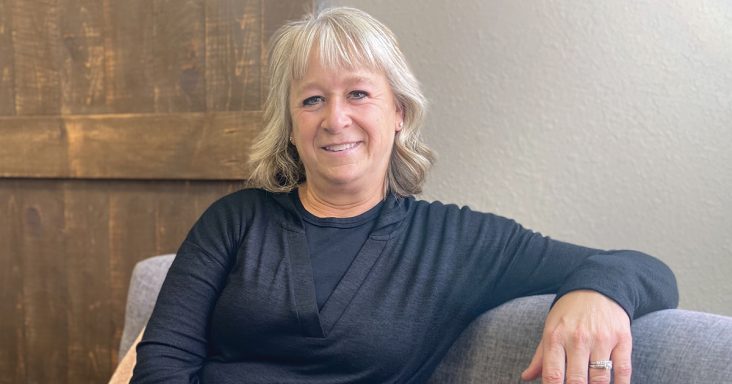Stacey Mason’s The Improv Lab takes a non-traditional approach to professional development
by October 28, 2021 9:41 am 1,072 views

Leadership consultant Stacey Mason is the founder and owner of The Improv Lab, a professional development business in Bentonville.
Bentonville-based The Improv Lab has offered non-traditional professional development since 2018.
Leadership consultant Stacey Mason is the founder and owner of the business at 123 S. Main St. that uses applied improvisation techniques to sharpen clients’ skill sets.
“I get a front-row seat to humanity at its finest,” she said. “We took a platform that people really don’t know or understand, and we’ve made it successful, intriguing and compelling. And there are people who believe in this work. I’m incredibly proud of that. It’s one of the hardest things I’ve ever done.”
The published author said that less than 100 people across the United States offer the type of non-traditional professional development provided at The Improv Lab. It’s the only Arkansas business with a similar offering.
Mason also leads the executive coaching business Mason On Leadership, which she established in 2010. She splits her time between the two companies that she said are intertwined. She noted that the executive coaching business has been strong recently because it’s shown to work, and the perception has changed from a tool to fix someone to a gift in which people invest in others to help them grow in their careers.
“It’s more forward-thinking and less punitive,” Mason said. “It’s an industry change that’s been welcome.”
Traditionally, professional development platforms and education have included PowerPoint presentations, classrooms, case studies, group projects and books, she explained.
“This [The Improv Lab] is a very non-traditional way to look at the conversations that we need to have around personality and behaviors and business acumen,” she said. “We’re just having those conversations through a different lens. The lens is the craft of improvisation.
“One of the reasons we named it a lab was so that people could come in here and feel comfortable tinkering,” she added. “We’re doing games, exercises and drills and activities that don’t matter… What matters is what you learned from that experience. Having a free pass to mess up is incredibly enticing to people who might be nervous about working on new skills with people staring at them.”
Mason said she got the idea to employ the non-traditional method of professional development in 2010 after taking an improvisation class offered by TheatreSquared in Fayetteville the previous year. She said the decision to take the course was random.

FINDING VALUE
Since she started the business, the use of applied improvisation has continued to evolve and develop.
“One of the greatest surprises about doing this work is shocking: the number of people … looking for validation in humanity that comes out in the conversations we have because 20 people are in the room, and we’re all doing something really vulnerable in front of people we don’t know,” she said. “All of the conversations at the end of the day net down into I want to feel loved, whole, secure, valued. I didn’t anticipate that when I said, ‘Look, we’re going to learn about public speaking or … how to think faster on your feet or … how to be more creative problem-solving.’ I didn’t think we were ultimately going to have a conversation about how I get there is driven by how much value people see in me.”
At the onset of the COVID-19 pandemic, business slowed for about three months in 2020. Still, after people got into the rhythm of wearing masks, sanitizing and physically distancing, it returned with some differences.
“I haven’t missed a beat since summer of 2020,” she said. “We have had full-on classes, full-on client events. We’ve just done it more thoughtfully. I purposely did not move my work to virtual. I think you can do it from an academic perspective, but I think what you lose in the face-to-face wasn’t worth the tradeoff of going virtual.”
Clients include academic institutions, community groups, entrepreneurs, Fortune 1 to 500 companies and nonprofits. Her top clients include Field Agent, Nabholz, University of Arkansas, Saatchi & Saatchi X and Walmart.
TRAVELING NATIONWIDE
“I travel across the U.S. doing this,” Mason said. “What’s so great about it is you … don’t need any technology. You need an open space to move around in and people to work with.”
Mason travels from coast to coast, including Atlanta, Charlotte, N.C., Chicago, Dallas, Denver, Houston, New Orleans, Phoenix and Silicon Valley. She declined to provide pricing but offers custom classes based on client demand.
Mason, the sole employee of her business, said she would like to embed her content and professional development platform into a college curriculum. She noted that a small number of universities offer what she provides, but she’d like to see it more widespread.
In 2008, Mason left an 18-year career with Walmart after leading large divisional teams from logistics and operations to global supply chain and enterprise inventory management. Later in her Walmart career, she worked in leadership development, executive development and culture coaching and was responsible for the retailer’s culture program, Walton Institute. Before establishing Mason On Leadership, she worked for nearly two years at the Soderquist Center for Leadership and Ethics at John Brown University in Siloam Springs, named for former Walmart executive Don Soderquist. The center is now called Milestone Leadership.
Sean Womack is the vice president of marketing and innovation at Rogers-based Happy Egg Co. He explained that Mason combines her experience in corporate leadership, human resources and training along with her understanding of improv so “even a buttoned-up executive can come and do it in a way that it isn’t weird. It gets them out of their comfort zone. It allows it to happen in a safe space, and it’s magical for a team and the things you’re learning. I think that piece is what’s so brilliant about The Improv Lab is that Stacey has all this corporate experience and this improv experience, and the way she blends the two is impressive.”
Womack learned Mason was using improv for professional development about four or five years ago before opening her 1,500-square-foot office in downtown Bentonville. She’d hosted a one-day improv class for Womack and his employees in a meeting room at 21c Museum Hotel in Bentonville.
“It was so great; watching her work with the team, getting them to work together but helping people find their voice,” he said. “It was really fantastic, and everybody had fun.
“Most of them were just scared to death about doing this, and all of them had such a great time. And I was like, ‘Wow, this is such a powerful tool.’”
REMOVING BARRIERS
Sarah Goforth, executive director of the Office of Entrepreneurship and Innovation at the University of Arkansas, was introduced to The Improv Lab while attending a class with colleagues.
“It was so relevant to our work and so much fun,” Goforth said. “I was pretty sold on Stacey and her model from that day on.
“I have hired her to work with students across any domain you can imagine,” Goforth added. “She’s worked with student-athletes, very sophisticated Ph.D. research students, business students. And I’ve seen her work with executives at the highest level of some of our companies in Northwest Arkansas. What she always without fail accomplishes in those groups is this dissolution of barriers that often get in the way of our highest purpose, our greatest ability to collaborate, our ability to solve tough problems. She does in a day or two what’s hard to teach in a semester or two.”
Sarah Gillmer is the senior director of business development at Fayetteville-based Field Agent. She said the improv class she attended with co-workers allowed them to come together in a non-traditional way to think about business and their problems, including communication internally or with clients, understanding success and giving and receiving information.
“It was a great experience,” she said. “At Field Agent, especially given the year we’ve had in the pandemic, we’ve all been working remote. We’re still mostly remote. We’re attempting to go back to the office in a few weeks, a couple of days a week, if we can keep everybody not sick. When you work remotely, it just changes business. Sometimes collaboration can suffer. Communication is different. While we are very productive at home, it’s hard to know when to turn things on and off.”
Gillmer had recommended The Improv Lab based on previous experience when company leaders were looking to do some team building and get the teams back together.
“It opened our teams’ eyes, especially for the pandemic. We were so chatty,” Gillmer said. “When hadn’t talked to each other in the same room for months. The ability to fellowship and bring a team back together after being apart for so long was priceless. And in a context where we could do something fun and learn about ourselves and learn about others in business was even better.”
